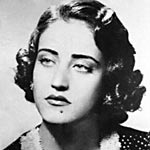Asmahan
[2] Having immigrated to Egypt at the age of three years old from Syria, her family knew the composer Dawood Hosni, and she sang the compositions of Mohamed El Qasabgi and Zakariyya Ahmad.[7] Asmahan's father supposedly served as governor of the district of Demirci in Turkey, during the last days of the Ottoman Empire, when he fled the country with his children and pregnant wife.[11] 'Alia chose to immigrate to Cairo, because she knew that Egypt's then nationalist prime minister Saad Zaghloul and her husband's relative, Sultan al-Atrash were on corresponding terms.In order to receive waivers for the high cost of tuition, 'Alia registered them under the alias Kusah (meaning "courgette") rather than trying to convince school officials that members of the wealthy[citation needed] al-Atrash family were destitute.Once, when her brother Farid received one of Egypt's most famous composers, Dawood Hosni, in their home, the latter overheard her singing in her room, and insisted on seeing her immediately.Asmahan rose to fame quickly: she was not even fourteen (or seventeen, since her birth date is disputed) years old when she was introduced to the public at a concert at the prestigious Cairo Opera House.At fourteen, Asmahan was invited by an Egyptian record company to make her first album, featuring her first song "Ya Nar Fouadi" by Farid Ghosn.Hosni volunteered to instruct Asmahan on how to play the oud; Qasabgi comments however on the mature level of her sight reading and musicality by the time she performed his work, some years later."[21] Since singers and studios depended on the elites, Asmahan had to sing songs on uplifting nationalist themes or in praise of the Egyptian royal family.When her first film, Intisar al-Shabab, was released in Syria, one young Druze shot at the screen when the character played by Asmahan appeared.Tabloid newspapers suggested that this was so that she could obtain a second divorce from Hassan; however, it seemed he actually agreed due to her visits to King David Hotel, Jerusalem where wild rumours attached to her behaviour and overspending.Asmahan was proud of her family background,[22] and always mentioned her father and his cousin, Sultan al-Atrash, to clarify her ancestry — once saying to al-Taba'i, after he had just insulted her, "Don't you know who I am?[33] Asmahan's noted wide vocal range included contralto and dramatic mezzo-soprano (as one can hear in her rendition of "Ya Tuyur" where she reaches a high A with ease and brio).She was on a secret mission to notify her people in Jabal al-Druze that the British and Free French forces would be invading Syria through their territory, and to convince them they should not fight.[36] On 14 July 1944, a car carrying Asmahan and a female friend crashed and went into a canal at the side of the road, after the driver lost control near the city of Mansoura, Egypt.[45] The Egyptian Media Production City and a private investor jointly produced a television series depicting the life (and death) of Asmahan.


MansouraKingdom of EgyptArabic musicSingerFarid al-AtrashArabicNorth LevantineDawood HosniMohamed El QasabgiZakariyya AhmadMohammed Abdel WahabUmm KulthumArab worldespionageWorld War IISyrianSuwaydaLebaneseHasbayaal-AtrashFrenchDemirciTurkeyOttoman EmpireİzmirBeirutJabal al-DruzeAdham Khanjar incidental-QrayyaDamascusPalestineEgyptian GovernmentnationalistSaad ZaghloulSultan al-Atrash"Baron" CraneKing–Crane CommissionCairo Opera HouseUmm KulthoumMena HouseAhmed BadrakhanKing David HotelMohamed al-Taba'iAhmed Pasha Hassaneincontraltomezzo-sopranobel cantoFrench Mandate of SyriaVichy FranceBritishFree French forcesSyria-Lebanon CampaignCharles de GaulleGeorges CatrouxEdward SpearsGestapoFustatAbdel Halim HafezEgyptian Media Production CitySulaf FawakherjiGoogle doodleIntisar al-ShababGharam wa IntiqamList of Druzearchive.todayYouTubeWayback MachineAl-RaidaAmerican University in Cairo Press